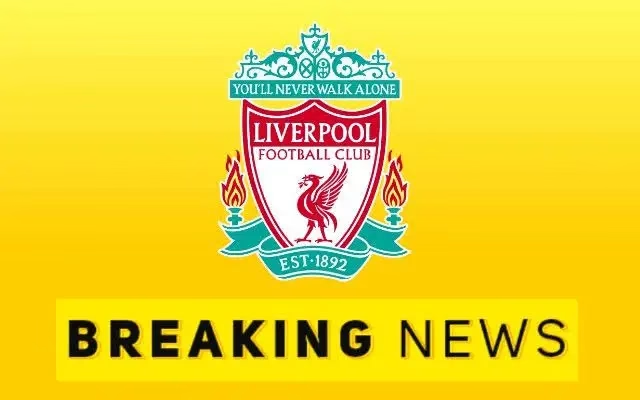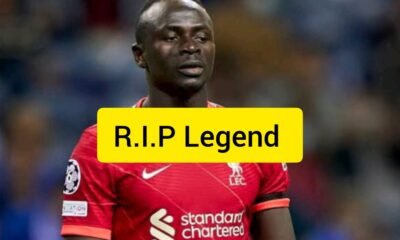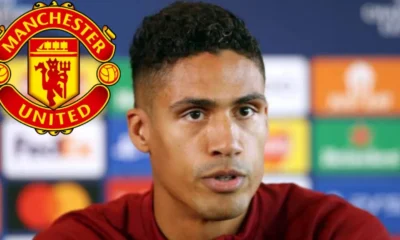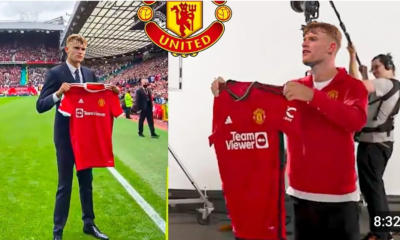Blog
Virgil van Dijk points finger at Liverpool team-mates after woeful Man Utd defeat

Virgil van Dijk remained immobile in the cool evening light of Anfield, as the last whistle boomed throughout the historic stadium. The scoreboard revealed a bitter fact for Liverpool fans: a 2-1 defeat to Manchester United, their fourth consecutive loss in all competitions. It wasn’t simply a loss; it was humiliation at home in front of thousands of fans who had hoped that this new period under Arne Slot would be one of growth rather than decline. But when van Dijk eventually spoke, the hush in the dressing room became even more intense. The captain, known for his composure and leadership, eventually snapped—and his remarks sent shockwaves through the team.
It was meant to be another night when Anfield erupted, and the Kop’s lights and singing would bring the team through difficult times. However, everything went wrong right away. Bryan Mbeumo of Manchester United ripped through Liverpool’s defence like a scalpel through paper after only 63 seconds. Giorgi Mamardashvili was left defenceless after just one pass and a lapse in concentration. The ball went into the net, and every Liverpool player looked at each other, bewildered, disappointed, and broken before the game even started.
Van Dijk clenched his fists and screamed for attention, but deep down he knew it wasn’t just poor fortune. This was a vulnerability. This team was losing its soul.
Liverpool spent the next hour chasing shadows. Cody Gakpo hit the post twice, Salah missed a clear header, and Isak squandered two excellent opportunities that would haunt him all night. Manchester United did not dominate possession, but they possessed belief, which was enough to repeatedly damage Liverpool. When Maguire rose to head in the second goal, Slot stood motionless on the sideline. His players were weary, bewildered, and detached. It was meant to be a derby, but the team appeared to be in free fall.
Inside the dressing room, the air was thick with anxiety. Some players avoided eye contact. Others sat with their heads bowed, staring at the floor as if it might explain why a team that once feared no one was crumbling week after week. Then came Virgil van Dijk.
He didn’t shout at first. He stood silently beside his locker, unstrapping each boot one by one. Everyone understood that silence spelled trouble. Then, with a heavy sigh, he turned and spoke in a sharp tone that rang throughout the room.
…
“This can’t go on,” he stated coldly. “We are Liverpool. Look around – does anyone here seem to care that we just lost to United at Anfield? Several players shuffled uncomfortably. Salah sat still, eyes fixed on the ground. Isak sat back in his seat to avoid Van Dijk’s sight.
“You,” van Dijk nodded to the striker, “are meant to be the finisher. You had two chances—two! In games like these, a single goal may change everything. But what have you done? “You pretended it didn’t matter.”
Isak opened his lips to answer, but van Dijk raised his hand abruptly. “There are no excuses. I have heard enough of them. Every week, we discuss about learning, improving, and correcting errors. But what is changing? Nothing. We keep repeating the same stupid mistakes. We keep walking back after yielding, as if it were normal. It is not typical. This is Liverpool, not a mid-table side.”
The captain’s voice became louder and angrier. Ryan Gravenberch attempted to interrupt, claiming that they were unfortunate and that the performance was not as poor as the score indicated. Van Dijk shook his head. “Luck? That’s what losers say when they can’t face the truth. We did not lose due to luck. We lost because we were not brave enough, because we were soft, and because we lost faith in what this badge represents.” The words remained in the air.
Slot, who had entered the room minutes before, stood calmly, listening. He did not stop van Dijk; perhaps he understood the guys needed to hear it. It was not the time for tactics or analysis. It was about pride.
Van Dijk then turned towards the midfielders. “You allowed them to walk through you.” You let Bruno Fernandes set the tempo. You’re supposed to be warriors in the middle, yet you appeared terrified. Mac Allister, I admire your fight, but tonight you appeared lost. The game passed you by. And I am not going to stand here and pretend everything is good. “It is not.”
Some players nodded silently, while others sat transfixed. Mamardashvili, the new custodian, appeared heartbroken. He had done his best but still received criticism. Van Dijk noticed and relaxed slightly. “You’re not the problem,” he said. “You have saved us more than once. But we need to improve our defence. We need to protect you. No goalie should confront such mayhem in front of him.”
There was a long gap before van Dijk spoke again, his tone softer but more serious. “When I first got to Liverpool, it was all about the heart. We didn’t always play the most attractive football, but we fought for everything. We instilled terror in teams coming here. Now? They walk in with the belief that they can win. That is what hurts the most. His remarks cut deep.
Arne Slot eventually walked forward, softly clapping his hands to break the silence. “Virgil is right,” he said. “We’re losing more than just matches; we’re losing our identity. I came here because I believed in the group. I thought you might lead Liverpool into a new era. But that only happens if you show me – not with words or tweets, but with football. “With fight.”
The players gently raised their heads. There were no laughs or disagreements, only the deep awareness that they had let each other down. Salah stood up first and approached van Dijk. “He’s right,” he replied quietly. “We need to be better. “Every one of us.”
That little moment of solidarity relieved the tension. However, the outside world was not kind. Social media was on fire. Fans raged, analysts derided, and headlines proclaimed Liverpool to be in disaster. The media described it as “the beginning of the end” for Arne Slot’s initiative. Some questioned van Dijk’s leadership, claiming that his statements had the potential to divide the dressing room. But those who knew Liverpool recognised that occasionally a leader must burn the stillness to rekindle the fire.
In the days that followed, rumours surfaced that Slot had secret meetings with many players, including Isak, Salah, and Mac Allister. He sought to rebuild trust, but he also desired accountability. He reportedly said to Isak, “I signed you to be a killer in the box.” I don’t worry about missed opportunities; I care about reactions. Next time, show me how angry you are when you miss. “Show me that you still want it.”
Van Dijk’s loss was personal. He’d led the squad through ups and downs, but this felt different. This wasn’t just terrible behaviour; it was emotional breakdown. During training, he pushed harder, shouted more, and expected more. Younger players, such as Ekitike and Kerkez, noticed and followed his lead. The mood slowly began to alter.
Journalists close to the club stated van Dijk spent an extra hour after each training session that week focussing on defensive structure with Konate and Mamardashvili. “We have to fix this from the back,” he allegedly told them. “If we stop conceding early, the rest will come.”
Behind the scenes, there were whispers that some players found van Dijk’s speech unpleasant. One anonymous participant told a journalist, “He is correct, but the way he stated it stung. We all care. We’re just struggling with our confidence.”
However, van Dijk was more concerned with norms than feelings. He understood what it takes to be champions. He realised that if Liverpool remained on this course, the title race would be over by Christmas.
Days later, Arne Slot spoke to the media, attempting to quiet the uproar. “Virgil is our captain because he cares,” he told us. “He wants the best for the squad. I agree with his statements because leadership is not about comfort; it is about truth.
Nonetheless, the strain was great. Fans demanded change. Some even advocated for Isak to be benched permanently. Others questioned whether Salah still felt the same hunger. Every error resulted in a headline. Every squandered chance sparks a debate.
But inside the club, van Dijk remained focused. He met privately with Arne Slot and told him, “Let me handle the dressing room. You focus on the football. I’ll get them back in line.” Slot agreed.
And so, the captain took charge. In the next team meeting, his tone changed. It wasn’t anger this time — it was belief. “We can fix this,” he said. “I’ve seen worse. I’ve been here when people said we were finished. But we came back then, and we’ll come back now. I don’t care what people say outside. They don’t wear this shirt. They don’t know what it means.”
He pointed to the Liverpool crest on his chest. “This isn’t just a badge — it’s history. It’s blood. It’s thousands of fans who’d give anything to see us win again. So fight for them. Fight for each other. And fight for this club.”
Those words reignited something. Training that week was fierce. Every tackle was stronger, every run harder. Slot even smiled once, watching Ekitike and Szoboszlai battle for a loose ball like it was a final. “That’s the spirit,” he shouted.
By the end of the week, even Isak seemed sharper, hungrier. He stayed behind after sessions to work on finishing drills with the coaches. Salah, too, looked more focused — no longer sulking, but demanding more from himself.
When matchday came again, Anfield waited nervously. Nobody knew if the storm had passed or if another embarrassment was coming. But one thing was clear — the fire had returned to their captain’s eyes.
Van Dijk led them out with his head high. The crowd rose, chanting his name. They hadn’t forgotten his honesty, even if it hurt. Because deep down, Liverpool fans know one truth — leaders don’t whisper when the house is burning. They roar until the flames die out.
The match that followed wasn’t perfect, but it was full of heart. Every player fought for every ball. Every challenge carried meaning. And when Liverpool finally scored late in the second half, van Dijk didn’t celebrate wildly. He simply clenched his fist, turned to the Kop, and nodded — as if to say, “This is the Liverpool I know.”
It wasn’t just a win on the pitch that night; it was a spiritual victory. The club rediscovered something that had been missing — pride. And though the journey ahead would still be difficult, the message was clear: this team would not die quietly.
For all the criticism, for all the chaos, one thing was now certain — Virgil van Dijk had reminded everyone who Liverpool truly were.
-

 Arsenal2 years ago
Arsenal2 years agoSad News Arsenal ex player who is goal scorer confirmed dead this morning
-

 Liverpool2 years ago
Liverpool2 years agoSad News Sadio Manè Confirmed Dead Today By Sky Sports Reporters, Open For Full Story 👇
-

 Blog2 years ago
Blog2 years ago“I was forcefully removed from Manchester United squad and now I’ve joined the best team in the world…I will revenge and as a result, I’ve ordered my friend who’s their best player currently to leave there with immediate effect and he has agreed”: Former Man United player angered by United decision to removed him from the squad as he ordered the Club’s best player to leave immediately.
-

 Blog1 year ago
Blog1 year agoSad News: Manchester United player died when playing for his country England yesterday 😢 😔
-

 Blog2 years ago
Blog2 years agoR.I.P: Formal Real Madrid and France international confirm death this morning
-

 Chelsea2 years ago
Chelsea2 years agoBreaking New:”Roman Abramovich could get Chelsea back”? Chelsea owner review the conversation between him and Roman Abramovich in. Deal about getting Chelsea back
-

 Blog2 years ago
Blog2 years agoUNBELIEVABLE: Manchester City midfielder KELVIN DE BRUYNE divorced wife this morning after DNA test revealed their 5 years old son belongs to formal Manchester United player
-

 Manchester United2 years ago
Manchester United2 years agoOFFICIAL NOW: Manchester United announce the signing of 23yr sensational player after beating Liverpool and Madrid for His signature, agreement reached on a 5yr deal, Medical completed – announcement ongoing
